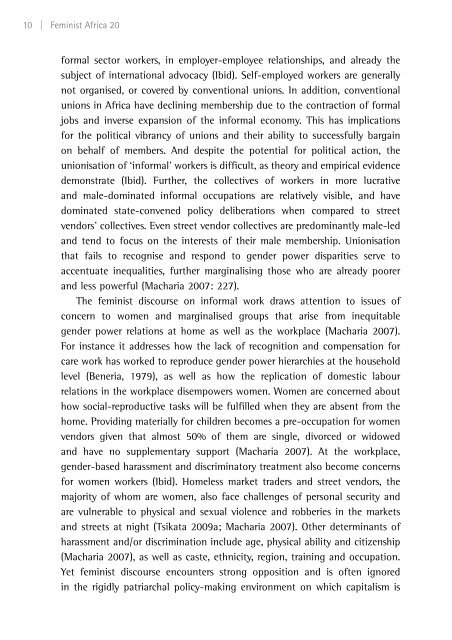Create successful ePaper yourself
Turn your PDF publications into a flip-book with our unique Google optimized e-Paper software.
10 | Feminist Africa 20<br />
formal sector workers, in employer-employee relationships, <strong>and</strong> already the<br />
subject of international advocacy (Ibid). Self-employed workers are generally<br />
not organised, or covered by conventional unions. In addition, conventional<br />
unions in Africa have declining membership due to the contraction of formal<br />
jobs <strong>and</strong> inverse expansion of the informal economy. This has implications<br />
for the political vibrancy of unions <strong>and</strong> their ability to successfully bargain<br />
on behalf of members. And despite the potential for political action, the<br />
unionisation of ‘informal’ workers is difficult, as theory <strong>and</strong> empirical evidence<br />
demonstrate (Ibid). Further, the collectives of workers in more lucrative<br />
<strong>and</strong> male-dominated informal occupations are relatively visible, <strong>and</strong> have<br />
dominated state-convened policy deliberations when compared to street<br />
vendors’ collectives. Even street vendor collectives are predominantly male-led<br />
<strong>and</strong> tend to focus on the interests of their male membership. Unionisation<br />
that fails to recognise <strong>and</strong> respond to gender power disparities serve to<br />
accentuate inequalities, further marginalising those who are already poorer<br />
<strong>and</strong> less powerful (Macharia 2007: 227).<br />
The feminist discourse on informal work draws attention to issues of<br />
concern to women <strong>and</strong> marginalised groups that arise from inequitable<br />
gender power relations at home as well as the workplace (Macharia 2007).<br />
For instance it addresses how the lack of recognition <strong>and</strong> compensation for<br />
care work has worked to reproduce gender power hierarchies at the household<br />
level (Beneria, 1979), as well as how the replication of domestic labour<br />
relations in the workplace disempowers women. Women are concerned about<br />
how social-reproductive tasks will be fulfilled when they are absent from the<br />
home. Providing materially for children becomes a pre-occupation for women<br />
vendors given that almost 50% of them are single, divorced or widowed<br />
<strong>and</strong> have no supplementary support (Macharia 2007). At the workplace,<br />
gender-based harassment <strong>and</strong> discriminatory treatment also become concerns<br />
for women workers (Ibid). Homeless market traders <strong>and</strong> street vendors, the<br />
majority of whom are women, also face challenges of personal security <strong>and</strong><br />
are vulnerable to physical <strong>and</strong> sexual violence <strong>and</strong> robberies in the markets<br />
<strong>and</strong> streets at night (Tsikata 2009a; Macharia 2007). Other determinants of<br />
harassment <strong>and</strong>/or discrimination include age, physical ability <strong>and</strong> citizenship<br />
(Macharia 2007), as well as caste, ethnicity, region, training <strong>and</strong> occupation.<br />
Yet feminist discourse encounters strong opposition <strong>and</strong> is often ignored<br />
in the rigidly patriarchal policy-making environment on which capitalism is


